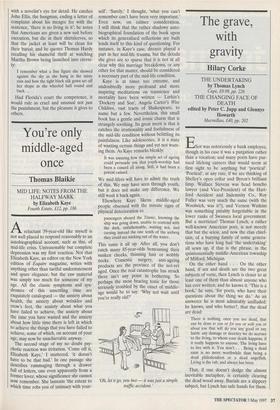The grave, with gravity
Hilary Corke
THE UNDERTAKING by Thomas Lynch Cape, £9.99, pp. 226 THE CHANGING FACE OF DEATH edited by Peter C. Jupp and Glennys Howarth Macmillan, £40, pp. 202 Eliot was notoriously a bank employee, though in his case it was a purgation rather than a vocation; and many poets have pur- sued lifelong careers that would seem at first sight to be anything but 'poetical'. `Poetical', at any rate, if we are thinking of Shelley's open collar and Byron's brilliant limp. Wallace Stevens was head honcho lawyer (and Vice-President) of the Hart- ford Accident and Indemnity Co., Roy Fuller was very much the same (with the Woolwich, was it?), and Vernon Watkins was something pitiably forgettable in the lower ranks of Swansea local government. But a mortician! Thomas Lynch, a rather well-known American poet, is not merely that but the scion, and now the clan chief- tain, of a burying family of some genera- tions who have long had 'the undertaking' all sewn up, if that is the phrase, in the quintessentially middle-American township of Milford, Michigan.
On the other hand . . . On the other hand, if sex and death are the two great subjects of verse, then Lynch is closer to at least one of them than almost anyone who has ever written; and he knows it. 'This is a book,' he says, 'for poets, who have their questions about the thing we do.' As an answerer he is most admirably unilluded: he knows, and who better?, that the dead are dead: There is nothing, once you are dead, that can be done to you or for you or with you or about you that will do you any good or any harm: any damage or decency we do accrues to the living, to whom your death happens, if it really happens to anyone. The living have to live with it. You don't . . . Being a dead saint is no more worthwhile than being a dead philodendron or a dead angelfish. Living is the rub, and always has been.
That, if one doesn't dodge the almost inevitable metaphor, is certainly clearing the dead wood away. Burials are a slippery subject, but Lynch has safe hands for them. Yet his clear wide eyes take a much less bleak view of the world than might at first then be supposed. He is little depressed by deaths but much cheered by the abundance of new life that closes in at once to fill The gaps: All the endings are not happy ones. Nor is every utterance a benediction. But for every death there's some redemption; for every loss an Easter out there with our name on it, for every woe a return to wooing.
It will be seen that The Undertaking is most beautifully written, strongly but delicately cadenced, without a word over.
The form of this little packed treatise, surely a classic, is by way of being a collec- tion of essays; but they tightly cohere. Holding up the act and the practices of funeral committal now to this light, now to that, Lynch gradually builds up an exem- plary short autobiography. Unlike most inhabitants of Milford, Michigan (one would suppose), the poet retains the closest relations with his distant origins in County Clare and even has, by inheritance, a primi- tive cottage there; the falling-apart of his first marriage recurs as a small, sad, inescapable motif; and at the same time we gradually apprehend in a three-dimensional way all the solidity and solidarity of Milford, its small-town morals and mores, even the saga of the con- tentious rebuilding of the Cemetery Bridge, all as clear as a toy town in a crystal snowstorm glove, yet instinct with Lynch's description of the subject-matter of most of his own verse — 'domestic perils, imminent damage, and the transcendent properties of death'.
Over any treatise on The American Way of Death must loom the mocking, malig- nant figure of Jessica Mitford, now sadly lately gone (the English way) herself. Rather magisterially, Thomas Lynch point- edly doesn't trouble to confront her: indeed, amongst his numerous illustrations, he reproduces some weird articles that he is prepared to supply himself, such as the `cultured walnut golf-bag cremation urn'. How far his tongue is in his cheek I am debarred by his bland American poker-face from determining; or from how far his soul is really in his daydream golf-course and Whispering Glades combined. But he does remark, almost in conclusion, that
I conduct this business very carefully because in the years since I've been here, when some- one dies, they never call Jessica. They call me.
Those not yet sated by mortality might care to look into The Changing Face of Death, which is a collection of accessible academic essays on very varied aspects of `the dismal trade'. I note particularly among them two horrific accounts of the customs of non-conformist chapels in cen- tral London in the early 19th century, which had no burial-grounds of their own but ran interments on the cheap for their votaries by shoving them under the floor- boards. In the case of Enon Chapel, just off the Strand, the floor was not of the stoutest construction and the planks gaped above the disgdsting charnel-hole below: The skilell was most abominable and very injurious; I have frequently gone home myself with a severe headache, which I suppose to have been occasioned by the smell, particularly in the summertime; also there, were insects, something similar to a bug in shape and appearance, only with wings; I have taken them home in my hat, and my wife has taken them home in her clothes.
So with the merry Dissenter's hatful of corpse-flies I take my leave, pausing only to remark that the reason why this pictureless volume should cost four times as much as Lynch's, which is prettily produced and lib- erally illustrated, is perhaps a matter beyond disinterment.



































































 Previous page
Previous page